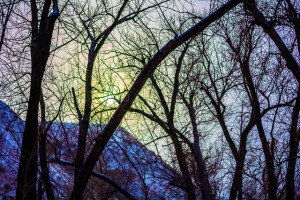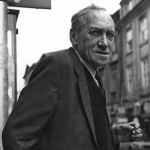 I have a complicated relationship with the sun, having grown up in southern California and now making my home in the moody Pacific Northwest. I swerve between desperation for even an hour of brightness and a stoic claim that my poet-soul finally feels at home in this rain-soaked climate. So Betsy Sholl’s poem about the longing for light—and its frustration by winter’s darkness—feels like it’s speaking directly to me, even as the lengthening days pitch us toward summer solstice. The poem’s four movements cast me out into the big questions, then draw me back in with quiet, simple sounds: “Now light…In my dream… Dawn in winter…” I love the stepping-stone quality of this poem’s thinking, how it steps carefully from image to image, as if the speaker were groping along the walls of some dark hallway while tracking a dream-truth. I stumble along holding tight to this poem’s unsure but deeply curious and trustful voice, as it moves from room to room. Here are familiar worries like “moths done with hunger, / white as tiny brides,” and a tree bearing fruit “only the birds, / and just a few of them, want to eat.” The poem is in some ways a procession of earthly failures, a meditation on the ways in which everything falls just short of oblivion—and yet finds light and grace again and again.
I have a complicated relationship with the sun, having grown up in southern California and now making my home in the moody Pacific Northwest. I swerve between desperation for even an hour of brightness and a stoic claim that my poet-soul finally feels at home in this rain-soaked climate. So Betsy Sholl’s poem about the longing for light—and its frustration by winter’s darkness—feels like it’s speaking directly to me, even as the lengthening days pitch us toward summer solstice. The poem’s four movements cast me out into the big questions, then draw me back in with quiet, simple sounds: “Now light…In my dream… Dawn in winter…” I love the stepping-stone quality of this poem’s thinking, how it steps carefully from image to image, as if the speaker were groping along the walls of some dark hallway while tracking a dream-truth. I stumble along holding tight to this poem’s unsure but deeply curious and trustful voice, as it moves from room to room. Here are familiar worries like “moths done with hunger, / white as tiny brides,” and a tree bearing fruit “only the birds, / and just a few of them, want to eat.” The poem is in some ways a procession of earthly failures, a meditation on the ways in which everything falls just short of oblivion—and yet finds light and grace again and again.
—Melissa Reeser Poulin
“Daybreak, Winter” by Betsy Sholl
Now light fills the tree outside our window—
tree whose fruit, when it comes, only the birds,
and just a few of them, want to eat, tree
that turns stiff and dry midsummer, rushing
the season, so we fear the city will come
and butcher it, though so far it’s been spared
because in spring it still swarms with thousands
of petals, white as moths done with hunger,
white as tiny brides flittering in the breeze,
asking, “Will I be happy? Is this a mistake?”—
or the question too few of us ever ask, “Will I
make him (or her) happy? Will I be able to love
when it’s hard?” Hard like waking for sunrise
midsummer—or reading Saint John of the Cross
who says light first comes to us as darkness.
§
In my dream it could have been the saint’s voice
that broke through some penthouse party, asking,
“Do you want to stay here in your red dress,
with your expensive wine and smart chatter,
or do you want something more?” And how
was my dream-self tapping at walls to know
one would creak open onto a dark corridor
where “more” became a slow procession, pilgrims
in hooded robes turning from everything bright?
At least our tree gleams—ours because it’s grown
higher than the upstairs windows, so we half dream
we live in its branches, ours because we tell
the seasons by it, blossom and leaf-fall-too-soon
and winter’s bare limbs, stripped like a saint’s
uplifted arms taking whatever comes as love.
§
Once I fell out of a tree. Watching, my love
thought it was my death he saw. Maybe it was—
that bright thicket of leaves I crashed through
like a clumsy bird, or like a girl left back
and too big for her grade. I felt that slow,
suspended in twig-snap and fluttering green,
not grasping it was big trouble. I still don’t
know how I got to where people stood over me,
asking, “Can you move this? Do you feel that?”
Whole minutes are blacked out. A young man said,
“If she walks away from this, I’ll believe in God.”
I don’t know if he did. But I got up, stepped
across the gap of lost time and torn boughs
into the sweet weight of sunlight striking earth
every second, whether we notice or not.
§
Dawn in winter. Delicate, as if a painter
had licked the tip of the brush for fine work—
first twig, then trunk, the light made visible
by what it touches. Years, and still that dream
haunts me, its deep voice, dark corridor
with torches flaring, guttering on damp walls,
and those hooded figures, all foot scrape
and drone, that deep hypnotic hum.
It went on and on, forever I thought,
until in the distance a low door appeared.
Through it a light-bathed garden and a tree
that may have been ordinary, hard to say
after all that darkness, after the dream
bent me so I could pass into—how easy
it sounds—the brightness, the green.
Betsy Sholl’s most recent book of poems is Otherwise Unseeable (Wisconsin), winner of the Maine Literary Award for poetry. She teaches in the MFA program of Vermont College of Fine Arts and was poet laureate of Maine from 2006 to 2011.
The image above is by Spencer Harris, used under a Creative Commons license.

















